
Data Reveals Tesla’s Brand Loyalty Declined After Musk Supported Trump

 :
| Updated On: 05-Aug-2025 @ 3:34 pm
:
| Updated On: 05-Aug-2025 @ 3:34 pmSHARE
Background & Loyalty Decline
Tesla enjoyed an industry-leading customer loyalty rate in the U.S., with 73% of Tesla-owning households buying another Tesla in June 2024, according to S&P Global Mobility analysis of vehicle registration across all 50 states. However, starting in July—following CEO Elon Musk’s endorsement of Donald Trump—brand loyalty plummeted sharply. By March 2025, loyalty had dropped to just 49.9%, slightly below the industry average. This represented an unprecedented decline in such a short period, as noted by S&P analyst Tom Libby.
By May, loyalty strength rebounded modestly to 57.4%, placing Tesla back above the industry norm and on par with Toyota, though still trailing behind Ford and Chevrolet. S&P described Tesla’s loyalty erosion as historically steep—no other brand had seen such a sudden fall.
Political Involvement & Consumer Response
The timing of the loyalty decline strongly suggests that Musk’s political activism alienated parts of Tesla’s eco-conscious customer base. Analysts believe customers with Democratic leanings may have shifted toward competing brands following Musk’s public alignment with Trump.
Compounding Pressures: Aging Lineup & New Rivals
Tesla’s product line has aged, facing fierce competition from new EV offerings by legacy automakers like General Motors, Hyundai, and BMW. The only new model released post-2020— the Cybertruck—underperformed relative to expectations, failing to generate significant sales volume.
Tesla CFO Vaibhav Taneja cited additional challenges in its April earnings call, including vandalism and hostility toward the brand, as well as lost production weeks while retooling factories to update the Model Y lineup. Musk maintained that absent broader macroeconomic concerns, demand remained solid.
Sales Decline & Market Share Loss
Sales trends reinforce the loyalty slump—U.S. EV sales dropped 8% in the first five months of 2025, while European sales fell 33% in the same period. Analysts attributed the decline partly to public backlash over Musk’s politics and intensifying competition.
CFRA analyst Garrett Nelson criticized Musk’s political timing as especially poor, given Tesla’s escalating competition from Chinese EV startups and established carmakers. Nelson flagged Tesla’s loss of market share and brand reputation among his top concerns.
Declining Net Customer Inflows
Previously, Tesla consistently acquired nearly five new households for each one it lost to another model. By contrast, from February 2025 onward, Tesla began gaining fewer than two households per one lost—its lowest net inflow ever. Notably, brands like Rivian, Polestar, Porsche, and Cadillac are now enticing more Tesla customers away than Tesla gains from them.
Outlook & Strategic Pivot
While Tesla still leads the domestic EV market, the erosion of loyalty underscores risks tied to Musk’s political interventions and product stagnation. Some investors remain bullish, citing potential in Tesla’s development of robotaxi services and self-driving technology licensing. A small robotaxi pilot was rolled out in Austin, though not yet publicly available; Tesla claims that successful expansion could eventually obviate the need to sell cars and trucks altogether.
Conclusion
Tesla’s precipitous decline in customer loyalty—from 73% to below 50%, before partial recovery—marks one of the most rapid brand sentiment shifts recorded in auto industry history. The decline appears driven by Elon Musk’s political associations, a dated product lineup, and surging competition. Though total sales remain robust by national measures, the loss of market share and erosion of brand trust pose growth challenges. Tesla’s long-term resilience now hinges on innovation in self-driving mobility and rebuilding brand appeal among environmentally-conscious and politically sensitive consumers.